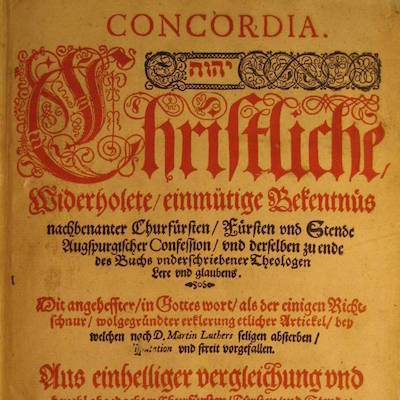Last month, we began to review and consider the Lord’s institution of the Office of the Holy Ministry in Scripture. We learned that the Pastoral Office is established by Jesus Christ with very specific tasks to be done: making disciples by baptizing and teaching, and forgiving or retaining sins (this is often referred to as the Office of the Keys). The bedrock of all this is the Holy Scriptures, which are the things which the Lord has given to be taught.
It’s a common cry among some Christians confessions that they have “no creed but the bible” or something along those lines. This is well-intentioned, no doubt, but ignores the reality of the Christian Church. We have the Scriptures, but they need to be interpreted, applied, and preached/taught. The Scriptures mean something – they are truth – which also means they can be taught falsely.
Throughout the history of the Church, false teachings have been dealt with by stating what is the right, true teaching. There are three statements of the true teaching of Scripture that go far back to the early days of the Church. These are the three Ecumenical Creeds (Apostles’, Nicene, and Athanasian), and these link the Church together in the truth of Scripture throughout the centuries. The Lutheran Church subscribes to these Creeds (that is, makes them her own) and expects her pastors to do the same. In the ordination rite, then, we hear this question and promise:
Do you believe and confess the three Ecumenical Creeds, namely the Apostles’, the Nicene, and the Athanasian Creeds, as faithful testimonies to the truth of the Holy Scriptures, and do you reject all the errors which they condemn?
Yes, I believe and confess the three Ecumenical Creeds because they are in accord with the Word of God. I also reject all the errors they condemn.
Notice that we don’t just blindly believe and confess the creeds because they are part of the history or tradition of the Church, but instead because “they are in accord with the Word of God.” This is commanded by our Lord in Scripture over and over again. For example, in the very beginning of Galatians (1:8), the Apostle Paul writes, “But even if we or an angel from heaven should preach to you a gospel contrary to the one we preached to you, let him be accursed.” We are to “test everything” (1 Thess. 5:21). In so doing we guard against “teaching as doctrines the commandments of men.” (Matthew 15:9).
As Lutherans we have a further confession of the faith that we subscribe to as congregations, and we likewise expect our pastors to subscribe. This further confession is the Lutheran confession of the faith, as it is recorded in the Book of Concord of 1580. Like the Ecumenical Creeds, this is a set of writings which proclaim the true teaching of Scripture, often over against other false or erring teachings. Here’s what the pastor promises:
Do you confess the Unaltered Augsburg Confession to be a true exposition of Holy Scripture and a correct exhibition of the doctrine of the Evangelical Lutheran Church? And do you confess that the Apology of the Augsburg Confession, the Small and Large Catechisms of Martin Luther, the Smalcald Articles, the Treatise on the Power and Primacy of the Pope, and the Formula of Concord–as these are contained in the Book of Concord–are also in agreement with this one scriptural faith?
Yes, I make these Confessions my own because they are in accord with the Word of God.
Again, we have these Creeds and Confessions not because they teach us how to interpret the Scriptures, but because they speak for us as to what the Scriptures teach. In so doing, they guide all of us as Lutherans as to how to apply the teaching of the Scriptures to our lives – and especially they guide pastors in the Lutheran church.
Therefore the next promise a pastor makes in his ordination is that as he carries out his pastoral duties – making disciples by baptizing and teaching, forgiving or retaining sins, administering the Lord’s Supper – he will do so as the Confessions instruct him. Scripture teaches certain things about the Pastoral Office and its duties, and the Confessions explain how these duties are carried out practically, so that the Gospel of our Lord Christ would not be obscured:
Do you promise that you will perform the duties of your office in accordance with these Confessions, and that all your preaching and teaching and your administration of the Sacraments will be in conformity with Holy Scripture and with these Confessions?
Yes, I promise, with the help of God.
The faithful pastor who holds to his ordination promises has a wonderful promise and assurance from his Lord:
“‘Let the one who boasts, boast in the Lord.’ For it is not the one who commends himself who is approved, but the one whom the Lord commends.” (2 Corinthians 10:17–18, ESV)
Next month we’ll break down the responsibilities of the Pastoral Office and examine the Scriptures that teach us regarding said responsibilities.
In the love of Christ,
Pastor Schuermann
